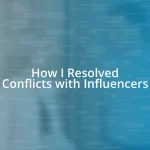Key takeaways:
- Understand contract terms such as compensation structure, scope of work, and exclusivity to avoid pitfalls and ensure successful collaborations.
- Negotiate fair compensation by knowing your worth and presenting your value to brands, transforming negotiations into collaborative discussions.
- Stay organized and proactive in managing obligations, communicate regularly with brands, and set clear boundaries to prevent scope creep and maintain quality standards.
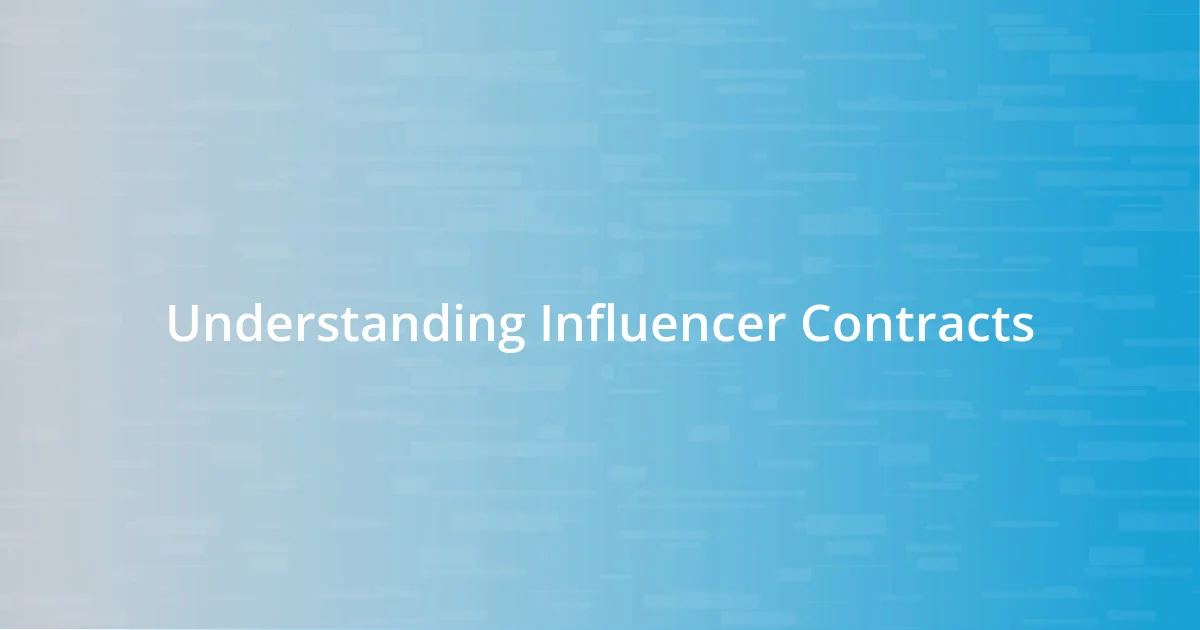
Understanding Influencer Contracts
Diving into influencer contracts can feel overwhelming at first, especially if you’re not familiar with the legal jargon. I remember my first contract; I had to Google terms like “deliverables” and “exclusivity” to make sense of what I was signing. It’s so important to truly understand what each clause means, as a single misunderstanding can shape your entire collaboration.
One key component to focus on is the compensation structure. Think about it—would you rather get paid a flat fee or opt for commission-based earnings? I once chose a commission model for a brand with high potential, and while it was risky, the return exceeded my expectations. Such decisions need careful consideration, so don’t hesitate to ask questions if something isn’t clear.
Additionally, the timeline in a contract can significantly affect your planning. I recall a project where the deadline felt impossibly tight, leaving me stressed as I scrambled to meet the brand’s expectations. By discussing these timelines upfront, you can ensure smoother collaborations. Isn’t it better to set realistic goals from the beginning?
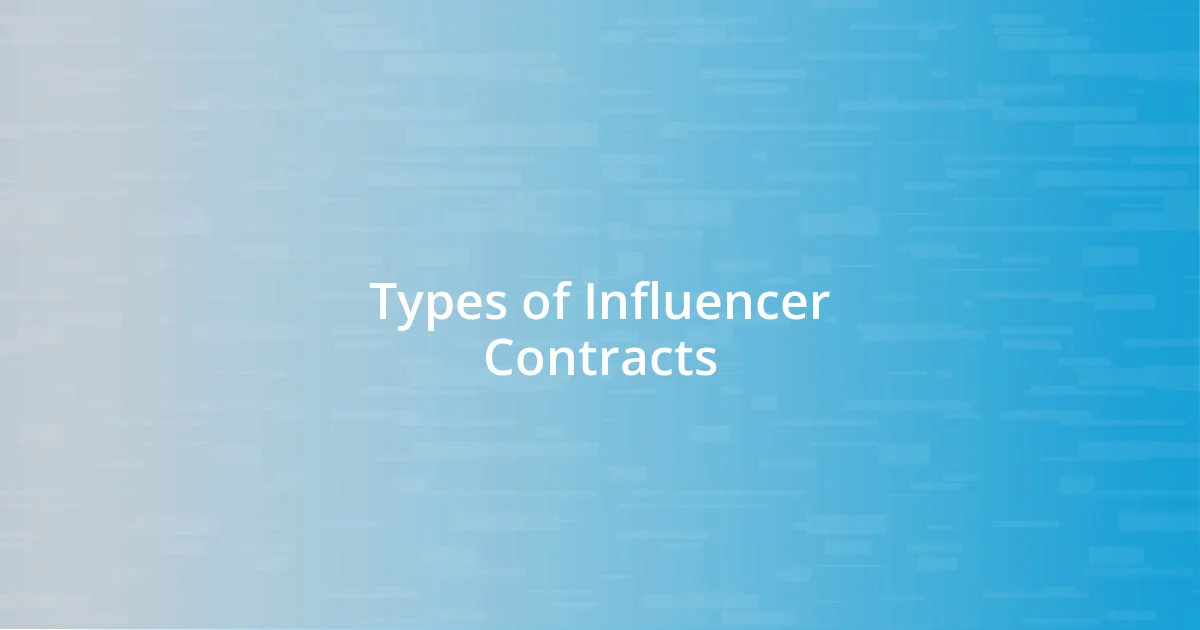
Types of Influencer Contracts
When navigating the myriad types of influencer contracts, understanding the key variations is crucial. I’ve encountered a few different structures, each tailored to specific needs and goals. For example, there are contracts based on deliverables, which clearly outline what content each party must provide. I remember working with a fashion brand that required three dedicated posts within a month—being clear about the deliverables made our collaboration far more enjoyable and stress-free.
Here’s a quick breakdown of some common types of influencer contracts:
- Flat Fee Contracts: You receive a set payment for specific deliverables, making it predictable but possibly limiting if engagement is high.
- Commission-Based Contracts: Payments fluctuate based on sales generated from your promotion, offering great potential but also uncertainty.
- Affiliate Contracts: These typically involve tracking links, allowing you to earn a percentage based on referred sales, aligning incentives with brand performance.
- Sponsorship Contracts: Brands cover the costs in exchange for promoting their products, often involving larger campaigns but requiring more commitment.
Each contract type can significantly influence how you shape your brand relationships; knowing these distinctions gives you leverage in negotiations. I’ve learned that having a clear understanding of these contracts can foster trust and transparency with brands, leading to more fruitful partnerships.

Key Terms to Review
When you’re reviewing influencer contracts, it’s essential to pay attention to the scope of work. This section lays out what’s expected from you and what the brand will provide in return. I remember a partnership where the scope was vaguely defined. It led to confusion about additional content, resulting in me doing more work than initially agreed upon. Defining these aspects will prevent any surprises and keep both parties accountable.
Another crucial term to examine is the ‘exclusivity’ clause, which can prohibit you from working with competing brands for a certain period. I once signed an exclusive contract without fully understanding its implications. It felt limiting to turn down opportunities during that time, which taught me the importance of discussing these terms thoroughly. To me, having the flexibility to work with multiple brands can enhance your creativity and boost earnings.
Finally, analyze the termination clauses. These clauses explain how you or the brand can end the contract prematurely. Once, I was in a contract that didn’t include a clear termination process, leaving me stuck when the partnership didn’t align with my goals. Trust me, having the right to terminate an agreement under specific conditions is vital for protecting your brand and interests.
| Key Term | Importance |
|---|---|
| Scope of Work | Defines expectations and responsibilities to avoid confusion. |
| Exclusivity | Impacts your ability to partner with other similar brands. |
| Termination Clause | Ensures you can exit a contract if it doesn’t serve your interests. |
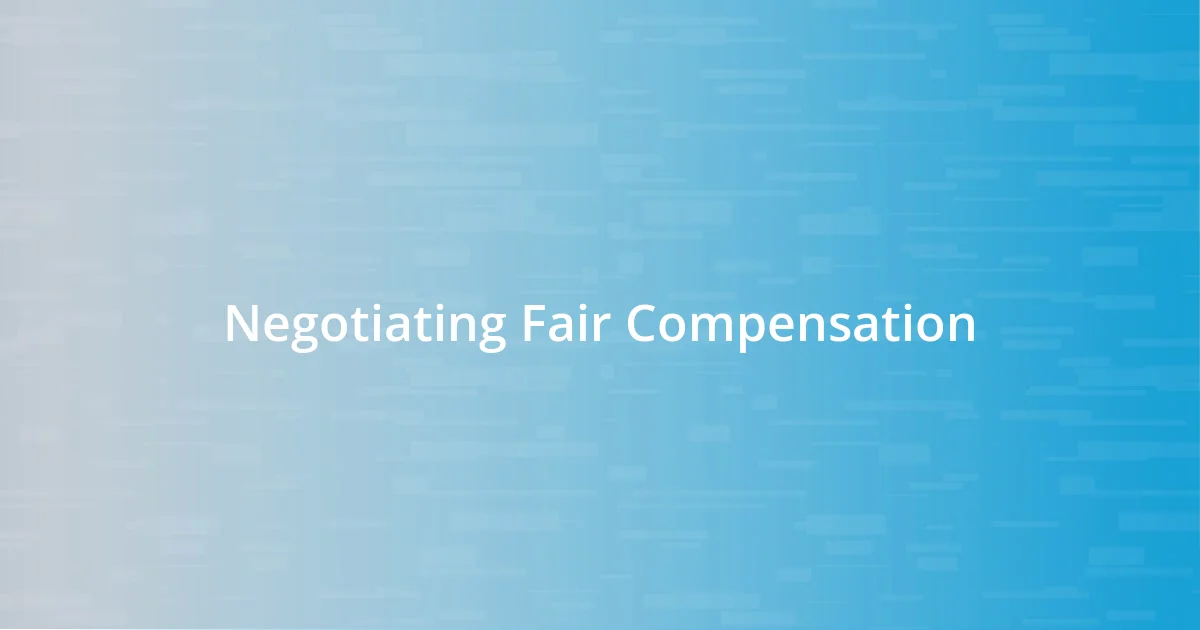
Negotiating Fair Compensation
Negotiating fair compensation can feel daunting, but I learned that it’s often about understanding your worth. I remember one negotiation where I hesitated, unsure about asking for a rate that reflected my engagement and audience size. But once I laid out my achievements, like a steady 20% engagement rate on my posts, the brand saw the value I brought to the table. It was a lightbulb moment for me; asking for what I deserved made the collaboration feel more rewarding.
One thing I’ve found helpful is researching industry standards before entering negotiations. There’s a surprising amount of data out there. I once pulled together compensation benchmarks and discovered I was underpricing myself significantly. Armed with that information, I felt empowered to advocate for better pay. It’s all about framing your request in a way that reflects the value you genuinely provide. Wouldn’t you want to be compensated fairly for your unique contributions?
Lastly, I think it’s essential to approach negotiations as a conversation rather than a battle. During one contract discussion, instead of just stating my desired fee, I shared my successful past campaigns that led to increased brand visibility. It transformed the dialogue into a collaborative process rather than an adversarial one. This experience taught me that effective negotiation is about building relationships and mutual respect, which ultimately leads to more lucrative and fulfilling partnerships.
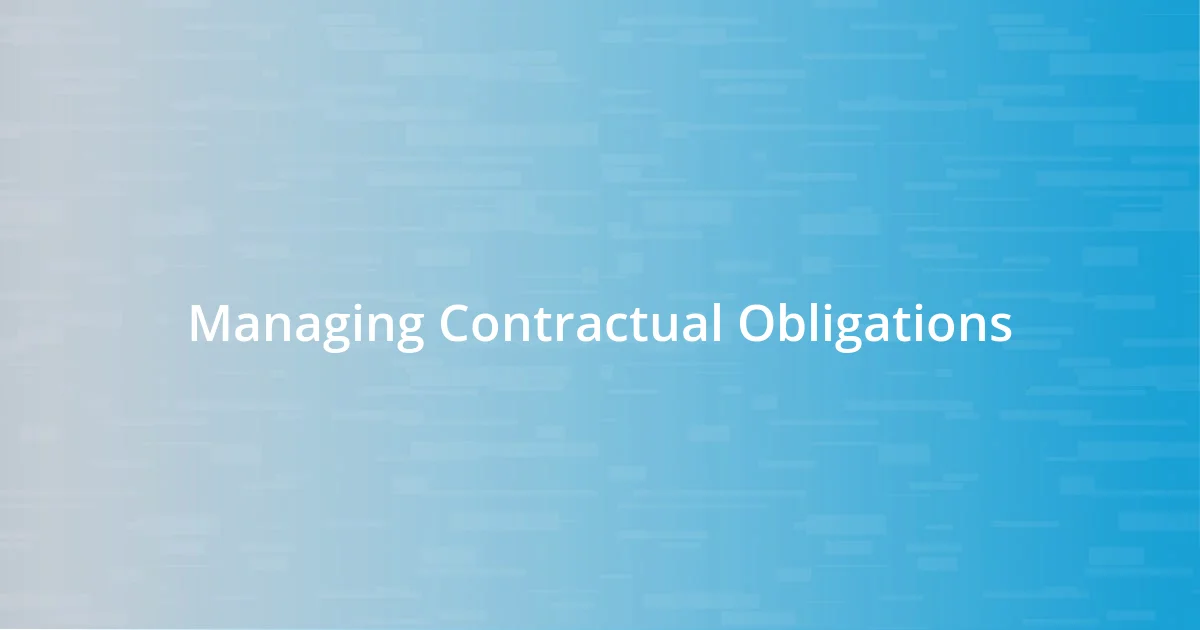
Managing Contractual Obligations
Managing contractual obligations is all about staying organized and proactive. I remember the first time I had multiple campaigns running simultaneously. Keeping track of deadlines, deliverables, and specific requirements was overwhelming. I found that creating a shared calendar with reminders helped immensely. This simple tool turned chaos into clarity, ensuring I met all my obligations without feeling stressed.
One of the most eye-opening experiences I had was recognizing the value of consistent communication. During one project, I hadn’t touched base with the brand throughout the campaign. As a result, I delivered content that didn’t align with their evolving vision. Once I established regular check-ins, everything changed. It kept both sides aligned and allowed me to pivot when necessary. Have you ever felt out of sync with a partner? It can be frustrating, but frequent communication can truly bridge that gap.
Tracking performance against the agreed-upon metrics is another crucial aspect I learned the hard way. There was a time when I didn’t monitor the campaign’s reach and engagement closely. When feedback came in, it was surprising to discover elements that didn’t resonate with the audience. By setting up reporting processes early on, I now ensure I can address any issues promptly. I’ve come to realize that managing these obligations isn’t just about fulfilling a contract; it’s about nurturing a relationship built on transparency and shared goals.

Common Mistakes to Avoid
One common mistake I’ve seen—and fallen into myself—is not reading the contract in detail. I remember one occasion when I skimmed through the terms, thinking I understood everything, only to discover later that usage rights were far broader than I anticipated. This oversight cost me potential future income. What’s more unsettling than realizing you’ve given away more than you intended? Taking the time to dissect every line of a contract can prevent costly surprises down the road.
Another pitfall is failing to account for deliverables and timelines. In one project, I was excited about the collaboration and rushed to agree on a quick turnaround. Unfortunately, that led to me delivering content that didn’t meet my usual standards. Have you ever felt the pressure of tight deadlines? It can lead to stress and, ultimately, mediocre work. Building in ample time for revisions not only enhances quality but also protects your reputation as a reliable content creator.
Lastly, don’t undervalue the impact of scope creep—when a project expands beyond the original agreement without additional compensation. I learned this lesson the hard way during a particularly demanding campaign. The brand kept adding more requests while I stuck to the initially agreed payment, feeling guilty for asking for more. How often do we prioritize keeping clients happy over our own limits? Setting clear boundaries and being willing to discuss changes helps maintain balance in your partnerships and reinforces your worth.
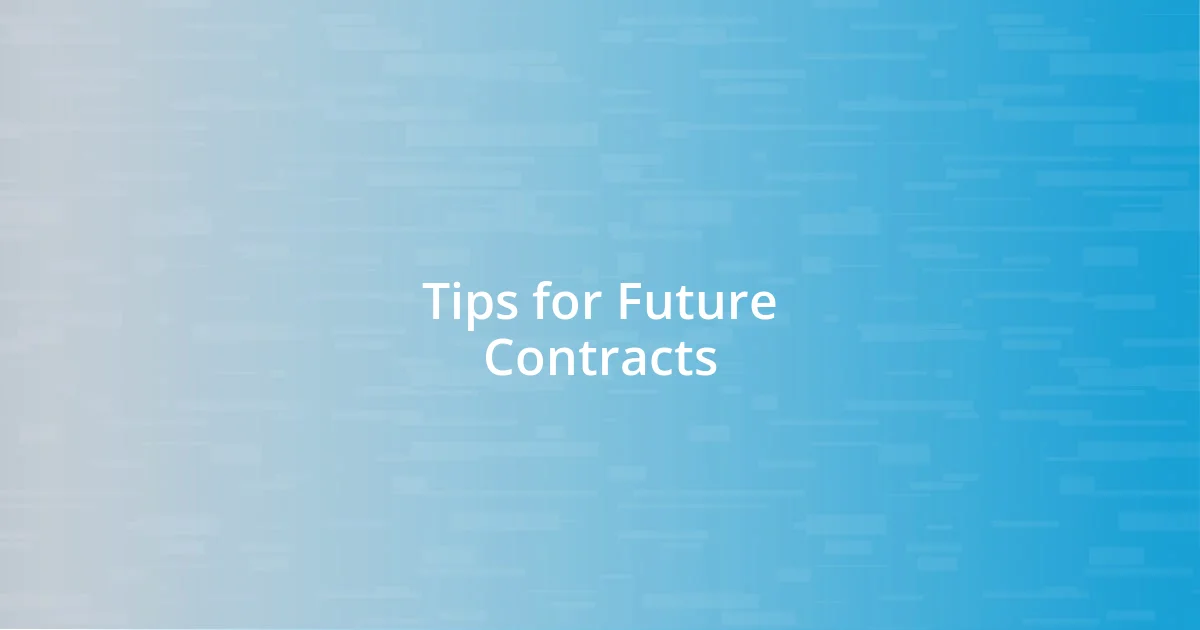
Tips for Future Contracts
It’s crucial to ensure your contracts clearly outline the payment terms. I once had an experience where payments were delayed because the contract wasn’t specific about the timelines. I felt frustrated, waiting weeks for money that was rightfully mine. Now, I always push for clarity on payment schedules—it’s a simple step that can save you from unnecessary stress.
Another essential tip is to negotiate your usage rights. In the beginning, I accepted terms without fully understanding them. One project left me feeling uneasy when I discovered the brand planned to repurpose my content indefinitely. Shouldn’t content creators have a say in how their work is used? I’ve since learned to advocate for limits on usage, ensuring I maintain control over my creations.
Lastly, always leave room for revisions in your contracts. I’ve faced challenges when brands requested significant changes last minute, making the workload feel insurmountable. I remember a time when I felt overwhelmed, questioning my ability to deliver on such short notice. Now, I include revision rounds in my agreements, which not only reassures me but also leads to better end results. Isn’t it empowering to know you can deliver quality without compromising your standards?













